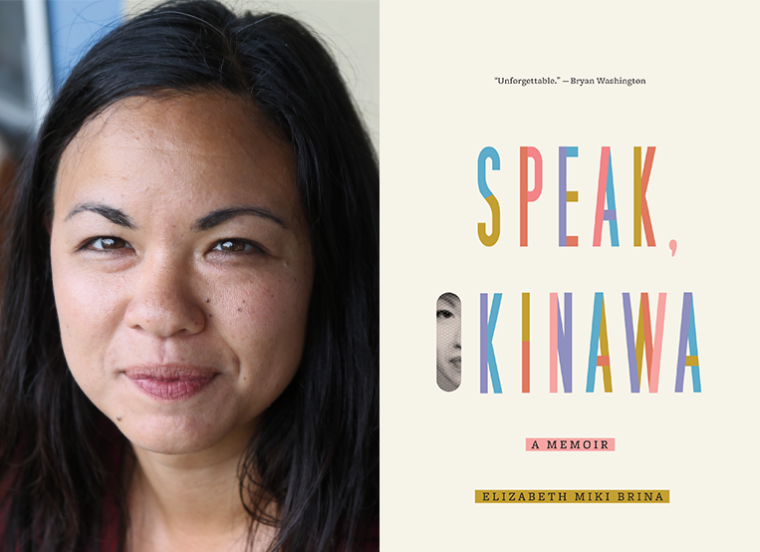This week’s installment of Ten Questions features Elizabeth Miki Brina, whose debut memoir, Speak, Okinawa, is out today from Knopf. As a child, Elizabeth Miki Brina held her mother at a distance. She was embarrassed by her mother’s accent, how conspicuous it felt in their predominantly white suburb in upstate New York. She did not yet understand the complexities of her parent’s relationship—her mother was born on U.S.-occupied Okinawa and met Brina’s father, a white American soldier, while working as a nightclub hostess. But as an adult, Brina begins to look at her parents with new eyes. She reexamines her memories, her family history, and the history of Okinawa itself. “I had not learned this history, my mother’s history, my history, until I was thirty-four years old,” she writes. “Which is to say that I grew up not knowing my mother or myself.” Speak, Okinawa is a virtuosic and unflinching search for clarity. “In exploring how one comes to be, Brina’s prose illuminates and dazzles—and we see, in the end, what was intangible made clear in her writing,” writes Bryan Washington. “Speak, Okinawa is indelible, and Brina’s words are unforgettable.” Elizabeth Miki Brina is the recipient of a Rona Jaffe–Bread Loaf Scholarship and a New York State Summer Writers Institute Scholarship. She lives and teaches in New Orleans.

Elizabeth Miki Brina, author of Speak, Okinawa.
1. How long did it take you to write Speak, Okinawa?
I started writing the essay that would eventually become the book in the summer of 2015. So, five years.
2. What was the most challenging thing about writing the book?
The most challenging thing about writing the book was deciding what personal details to share or not share, deciding what was mine or not mine to share, and knowing that these decisions would affect and alter the narrative, as well as the reader’s perception of and attitude toward the people being portrayed. This was a great deal of responsibility that I didn’t want to abuse. Kept me awake some nights.
3. Where, when, and how often do you write?
I write on my porch and backyard mostly, sometimes in my office when the weather gets too ugly. I typically write at night, though sometimes I sneak moments during the day. I have a solid writing session about twice a week.
4. What are you reading right now?
I’m reading A Manual for Cleaning Women, a short story collection by Lucia Berlin. It’s fantastic.
5. Which author, in your opinion, deserves wider recognition?
I’m not the most up to date or in tune when it comes to discovering new or underappreciated authors. Julie Otsuka wrote one of my favorite books, The Buddha in the Attic, which won the PEN/Faulkner Award, but I still think it should get more attention. Maybe it is. Maybe it will.
6. Would you recommend writers pursue an MFA?
Yes. Absolutely. I learned so much from the workshop process: submitting drafts, reading drafts, receiving feedback, and trying to articulate what invites and moves or what falls flat on the page and why. Not to mention the camaraderie and lifelong connections. The MFA experience was invaluable to me.
7. What is one thing that your agent or editor told you during the process of publishing this book that stuck with you?
Both my agent and my editor have been incredibly encouraging and supportive. All of their continual reassurance and validation and faith in the importance of this story sticks with me.
8. What is one thing that surprised you during the writing of Speak, Okinawa?
I was surprised by how much I remembered, and how much my perspective of memories shifted as I was writing, rewriting, and revising. There were so many revelations I could only have reached through the process of putting memories on paper, seeing them reflected back at me, trying to view them objectively and find the precise words to describe them.
9. Who is your most trusted reader of your work and why?
Besides my editor at Knopf who is so brilliant and generous and thoughtful with how she reads, I have a couple close friends from my MFA program that I trust the most for different reasons. One of them praises and uplifts, but in a very pointed and concerted way, while asking more open-ended questions that make me feel safe and allow me to explore. Another friend scrutinizes and resists, a bit harshly for my thin skin, but that’s precisely what I need to toughen up and retort with something better.
10. What’s the best piece of writing advice you’ve ever heard?
There is a quote by Adrienne Rich that I always keep in mind: “You must write, and read, as if your life depended on it.” It helps me to write about the deeply personal, the private, to trust the reader with my secrets, to take risks and pursue high stakes.








